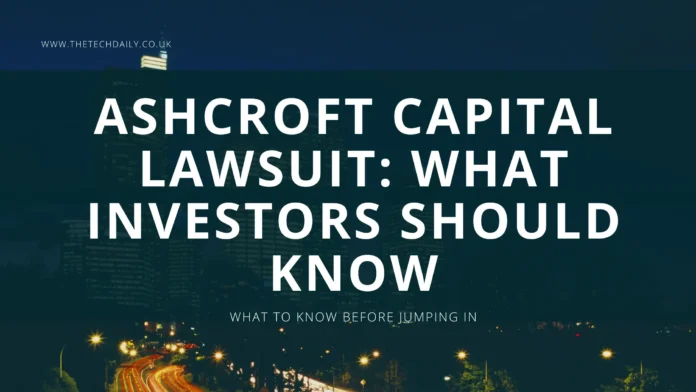Introduction About Ashcroft Capital Lawsuit
Both real estate investors and industry analysts have been following the Ashcroft Capital lawsuit quite closely in the last few months. As many current and prospective investors seek answers on the unfolding legal matters associated with this real estate investment firm, certain key questions need clarification.
What are the real legal issues at stake? What could be the potential economic impacts? And perhaps, the most critical question—what actions should investors take moving forward?
This article responds to the above queries. With an in-depth analysis of the Ashcroft Capital lawsuit, their history, potential impacts, and the legal details, this guide aims at helping investors take better decisions.
Overview: More about Ashcroft Capital
Active in the entire U.S. real estate investment landscape, Ashcroft Capital focuses on value-add multifamily properties. Ashcroft Capital was established by Joe Fairless, an established name in real estate syndication, who has been able to raise millions in investor capital to acquire and manage apartment complexes. This business model is appealing, especially to passive investors who want to earn through real estate without the complexities of active management.
In the last few years, the firm maintained an image of professionalism by providing consistent updates and participating in podcasts and investment platforms. It now appears that the firm’s image has been tainted by the recently uncovered legal issues, which raise questions about the firm’s internal policies and transparency with investors.
What Is the Ashcroft Capital Lawsuit About?
Allegations and Legal Claims
The Ashcroft Capital lawsuit involves allegations of misrepresentation and possible breaches of fiduciary duties. Although the entire form of a legal document may not always be accessible to the public, investor concerns and available filings have raised the following red flags:
- Inaccurate 2 projections presented to investors.
- Opaque operating performance and fund usage.
- Communication lags regarding underperforming assets or exits.
- Alleged breaches of contract terms linked to syndication structures.
As the business model evolved during a recent market shift, investors assert they had not been educated on the financial risks involved. A number of them believe the company, as a whole, did not abide by the legal obligations of trust vested in them expected of syndicators.
Who Filed the Lawsuit?
The Ashcroft Capital lawsuit centers around a discontented faction of the investor base, some of whom are high net worth individuals who took part in one or more multifamily syndications. This group, in their pursuit of legal redress, has been reported to be represented by a legal team seeking damages for the alleged mismanagement of funds.
Despite the absence of published names alongside suit numbers, the matter has piqued interest on syndication focused investor forums.
Primary Progressions in the Case
Changes to the Economical Market
Part of the lawsuit is created by the overarching impact of macroeconomic factors. Real estate syndicators in the industry have been faced with the effects of rising interest rates, decreasing property values, and strict lending policies. Ashcroft Capital is not exempt.
Nonetheless, the Ashcroft Capital lawsuit claims that the situation was exacerbated by lack of management strategies, failure to plan for contingencies, and misleading communications about the situation that were provided to the investors.
Capital Calls and Stopped Distribution
According to the investors, some properties managed by Ashcroft have ceased to make or have delayed making distributions. Others noted that capital calls were made which is requesting investors for more money to stabilize underperforming assets. The lawsuit raises the question of whether these financial stressors were too much to navigate and whether appropriate disclosures were provided to investors.
Effects on Present and Potential Investors
Current Investors
Investors who are already participating in Ashcroft Capital deals may be impacted directly. Some experienced investors may face exposure to funds or properties that are linked to the lawsuit and may have to deal with protracted holding periods, reduced returns, or losses. Exiting investors may face legal barriers to returns that may frustrate their expectations.2. Prospective Investors
Should you be looking into real estate syndications or have Ashcroft Capital caught your eye, let this lawsuit serve as a real wakeup call to your due diligence. Legal exposure, management quality, and transparency are the few red flags that should be front and center on your checklist ahead of any funding commitments.
How This Affects the Real Estate Syndication Industry
The Ashcroft Capital lawsuit stands as a single case, but it certainly signals a larger concern within the real estate syndication model. Even the most reputable syndicators may get caught up with shifting market dynamics.
Key takeaways for the industry include:
- Investors remain under-educated about risk and return.
- Sufficient invoicing from the SEC on syndication practices.
- Meaningful pledges of unrestricted visibility, accounting standards, and independent audits.
Some investors now prefer to work with sponsors who exceed the minimum disclosure requirements or have substantial skin in the game, investing heavily in their own deals.
Legal Perspective: What Happens Next?
Investigation and Discovery
Step one in a civil litigious process assumes a filing party, preemptively marked as the defendant, takes the case to civil court. The subsequent step is called discovery, in which evidence, witness statements and documentation are shared. This could provide clearer answers on Ashcroft Capital’s decisions internally and externally and if their actions were legal.
Potential Scenarios
The Ashcroft Capital lawsuit can conclude in any of the following ways:
- A settlement, where the parties involved negotiate a settlement without accepting blame.
- A ruled decision by a court of law, resulting initiating fines, restructuring, or a change in leadership.
- Dismissal, if the court rules on lack of evidence on the claims presented.
No matter which way the case goes or if the case goes to court, the firm’s reputation and investor’s confidence in the firm will most likely fall.
What Actions Should Investors Take Now?
If you are a current investor of Ashcroft Capital or similar syndications, follow these guidelines:
- Business review: High net worth individual business review of their deals are essential to for determining on their exposure vis a vis sponsor relationships.
- Consult a legal professional: If you think you are a victim of a fraud, a lawyer will not get you in the next aggression but, in fact will guide you on how to go about it pleasantly.
- Avoid oversaturation: Do not put all your funds in a single strategy, sector or even a single sponsor.
- Observe the case: Visit investor platforms, newsletters, or your investment portal and monitor the case’s progress.
Conclusion and Synopsis
The Ashcroft Capital lawsuit is an alert for most players in the passive real estate investment space. While Ashcroft Capital built its reputation on trust and professionalism, the current legal troubles call to question how that trust was upheld during turbulent times in the market.
Whether you are a current investor or a potential one looking into syndication, this lawsuit serves as a critical reminder to thoroughly vet sponsors, comprehend the legal frameworks in place, and remain vigilant. The outcome of this case, as it progresses, has the potential to transform expectations for investors and set new benchmarks for syndicators for many years.
Top 5 FAQs About the Ashcroft Capital Lawsuit
Q: What is the Ashcroft Capital lawsuit about?
The lawsuit asserts misrepresentation, lack of disclosure, real and apparent active participants in the syndication fraud, and Ashcroft Capital’s breach of fiduciary responsibilities in the real estate syndications.
Q: Who filed the Ashcroft Capital lawsuit?
The lawsuit comprises a class action among a group of investors who participated in Ashcroft’s syndication deals and are legally seeking compensation for the alleged financial losses suffered.
Q: Will investors lose their money?
Not entirely. Although some of the assets are underperforming, active legal proceedings may generate restitution or settlements depending on the outcome.
Q: What is the impact of the lawsuit on new investors?
The lawsuit may increase the caution and diligence exercised by new investors when evaluating and considering syndication sponsors, particularly in the multifamily space.
Q: What action should Ashcroft Capital current investors take?
Investors should undertake a detailed review of legal documents, update themselves on the case, and consult a legal professional if they feel there has been financial damage to their interests.



